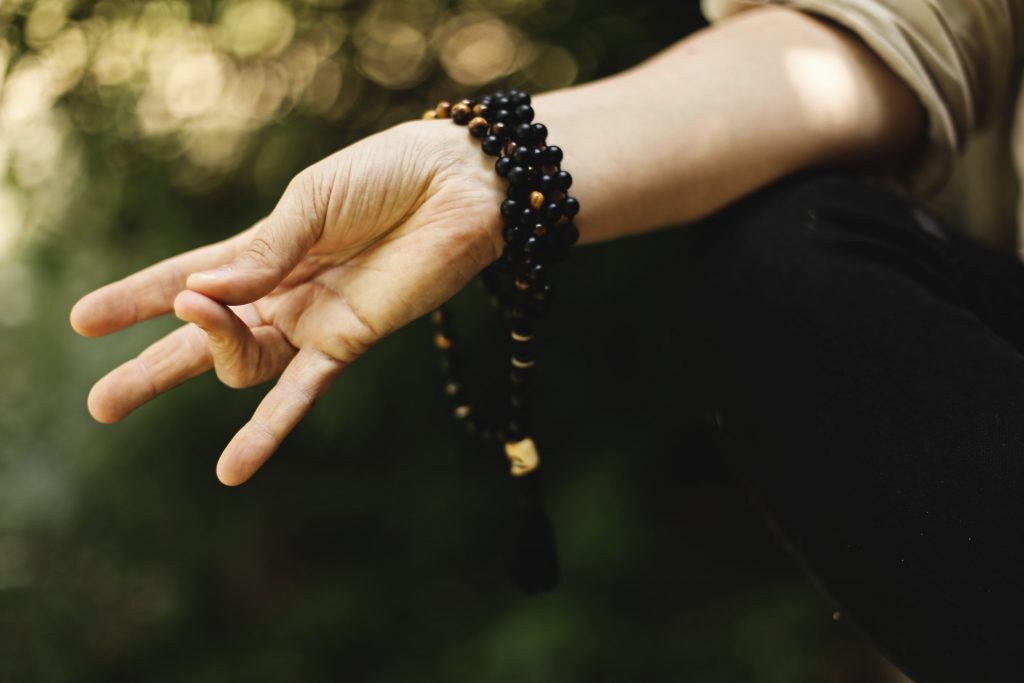In this month's Wisdom of Ayurveda column, Shama Palmer shares lifestyle tips and herbal remedies for supporting the immune system and fostering wellness for the body and mind

Stressful times weaken not only our mental health, but also our physical resilience. We become more susceptible to illness and infection during stressful times like those many of us find ourselves in during the COVID-19 pandemic. More than ever, we need to strengthen that immune resilience.
The first thing that Ayurveda would invite you to do during these times is to take care of your daily rhythms. Remembering the two 'R's – routine and regularity – can go a long way to supporting your ongoing health and resistance to the effects of stress. It might seem like a basic concept, but Ayurveda views a lifestyle led by these principles as fundamental to the health of our nervous system and to the steadiness of our body and mind. It is one of the keys for keeping Vata dosha pacified – this dosha is aggravated when we are stressed or when our usual daily routine suddenly changes, as has happened for many of us. Regularity in routine means sleeping, waking, exercising, working and eating at regular hours to help your body systems sustain optimum functioning.
For example, let’s think for a moment about how crucial to our health digestion is. If we don’t digest properly, we don’t eliminate well and toxicity accumulates in our system. This places a burden on the body, its immunity and energy levels. It also means that you probably cannot assimilate nutrients well, further impacting immunity.
If the body knows the times to expect food, it will start to prepare to digest in advance. In addition, regularity in eating times means you can spread your meals out with at least four hours between them for complete digestion of each meal before the next, and you can be sure to eat at least four hours before going to bed. You are also less likely to be putting fresh food on top of undigested food in your gut – when that happens, you can be eating the best quality food in the world but it will become toxic as it sits in your gut waiting for its time to be digested.
Vata dosha – the key to stress resilience
These eating habits have clear relevance to strength and immunity in the body as they support a better digestion. Yet what is the link to stress resilience? Ayurvedically, the key is Vata dosha. When we are stressed, Vata dosha goes up and as that happens we experience symptoms of increased Vata dosha. These may include more anxiousness and worry,
worsening insomnia, and even breathlessness or irregular breathing.
Both a regular daily routine and food itself have a pacifying effect on excess Vata dosha. This is why it is also not a good idea to skip meals (though some Ayurvedic types can miss breakfast) and also means that if you are one of the many going through a particularly stressful period right now, it is a good idea to have a light snack mid-afternoon to keep Vata dosha pacified at the Vata-dominated time of day. A piece of lightly stewed fruit or a small handful of dried fruits and seeds are a good idea, or a cup of
Golden Milk (turmeric latte) can be a yummy, warming and balancing alternative to a snack.
It’s good to make a resolve to be in bed by 10.15pm latest. The period between 10pm and midnight is important for the body’s rejuvenation and restorative processes, including replenishment of the adrenals. It’s the time when the effects of the day’s stresses get processed mentally, emotionally and physically. When we habitually remain active during these hours and the body cannot properly carry out its repair work, we can feel depleted the next day. When we feel depleted and we keep pushing on to get through our daily chores and responsibilities, we are challenging Vata dosha. That means we can lose that steadiness and calmness of body and mind that we are looking for. And when we lose that, we lose also much of our capacity for stress resilience.
From an Ayurveda perspective, the time between 6pm and 10pm is the Kapha dosha time of day and this means that ideally we should adapt our evening rhythms accordingly, aligning ourselves with the qualities of Kapha dosha. This will include slowing down, avoiding work or other stimulating activities in the evening, reducing screen time and enjoying something relaxing like a warm bath, soothing music, a little self-pampering and a few minutes’ gentle, slow and rhythmical breathing practice. After 10pm we move into the Pitta time of night, which is why you may find that you sometimes find a second wind if you stay up late. However, we ideally want to be resting by this time so that our body can use this energy for its important rejuvenating work.
Routine and Regularity
If you remember the two 'R's, develop a healthy regular daily routine, stay as far as possible from stressful, stimulating or adrenaline-raising interactions and activites, eat a whole foods diet and adapt regular sleeping habits, you will be going a long way towards supporting your body and mind through these troubled days.
We all know that stimulating foods and drinks loaded with caffeine and sugar should to be avoided or reduced, but this is especially true during stressful times. Caffeine activates the adrenals to release more cortisol into our blood. That gives us the pick-me-up we are looking for, but in the end it causes our already overworked adrenals to fatigue. We are then once more susceptible to the effects of stress on our bodies and minds.
I am always aware when I meet with my clients that there is a psychology in much of which we enjoy to eat and drink. If we have to take something away, I always work with them to find something we can replace it with which is also enjoyable and feels like a treat. Golden Milk is a great substitute for a mid-morning or afternoon tea or coffee: there is something very comforting about it. A medjool date or a small handful of nuts and dried fruit is a satisfying, light and healthy snack that can take away sugar cravings in the mid-afternoon and yet not throw blood sugar and adrenals out of whack.
After finding your way to implement a more balanced, regular routine, add a little more support from some of the amazing herbs that Ayurveda has to offer for stressful times. I have intentionally left the herbs until last. Ayurveda is very much aware of the importance of bringing balance to our bodies and minds with a healthy lifestyle before turning to herbal remedies. You might find you don’t need the herbs after all – the lifestyle shifts can be that powerful.
Herbs for stressful times
Here are some of my favourite herbs for stressful times. Please use them respectfully and with the guidance of a qualified Ayurveda practitioner.
Nutmeg, a familiar warming spice, has nervine actions and is used in Ayurveda for all kinds of nervous disorders, as well as for certain digestive issues. Add a pinch of fresh ground nutmeg to a warming cup of milk in the evening as a bedtime drink, or to a stewed fruit snack or breakfast. Pitta types should use sparingly due to the warming nature of this spice.
Lavender is a Western herb that we can use with an Ayurvedic awareness. As you are already perhaps aware, it has calming properties and can support sleep but is also said to have anti-depressant qualities. However, it can raise Vata dosha. I antidote that tendency by taking a pinch of lavender warmed with a cup of hot milk for another tasty, relaxing bedtime drink. You can of course add honey or stevia to taste if you'd like.
Brahmi (Bacopa monieri), also known as
Water Hyssop has a powerfully balancing, regenerating effect on the brain and brain chemistry and is safe when consumed in small doses. It is suitable for all three doshas and is a great nervine and adaptogen. Adaptogens help to counter the effects of stress on the nervous, endocrine and immune systems. It can bring support to both anxious and depressed states of mind. In larger doses it can be toxic and can also put Vata up, so again, please do consult a qualified practitioner before taking this remedy.
Mandukaparni (Indian Pennywort) might be more familiar to you as
Gotu Kola. It is said to rejuvenate the mind and brain. It acts as a nerve tonic, reducing stress and promoting a calm, clear mind and mental focus. In the long term, it can be used to overcome the adverse effects of stress. It is also suitable for all three doshas, but once more needs guidance with dosage and use, as excess intake can cause headaches or skin itching.
Ashwagandha is an adaptogenic herb and one of the main rejuvenators used in Ayurveda. It is good for low immunity and general debility or nervous exhaustion through stress. It is a fantastic herb, but bear in mind that whilst it has been shown in studies to be safe for long term use, there are individual factors to consider always. These include your age, your gender and your dosha type. Again, do take professional advice. It is certainly not recommended during pregnancy without professional guidance.
I hope there is plenty for you to take away from this article for support through our tough days, individually and as a nation. Keep faith, keep trusting. With love to you all.

About the author
Sara Palmer (Shama) is an ayurveda practitioner and registered senior yoga teacher and therapist. If you'd like to learn more about agni, ama, ojas, your constitutional type and self care in ayurveda, Shama is running Ayurveda Living courses online.
www.loveyogahealing.com
More from this author:
The Wisdom of Ayurveda: Immunity Boosting Herbs and Spices
The Wisdom of Ayurveda: What It Really Is and How It Works
The Wisdom of Ayurveda: A Meditation for the 21st Century Mind (plus Golden Milk recipe)


















